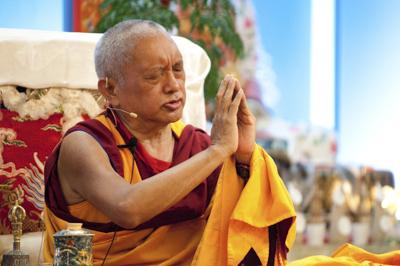Benefits of the Heart of Amogapasha Mantra

Heart of Amogapasha Mantra
om amogha shila sambhara / bhara bhara / maha shuddha sattva padma bibhushita bhuja / dhara dhara / samanta /avalokite hum phat svaha
Yesterday I brought the book to explain about this mantra. In our normal daily lives, it is very good to recite this in the morning after completing prostrations while reciting the names of the Thirty-five Buddhas. Normally the mantra is recited when we take the Eight Mahayana Precepts, but it can be recited even when you are not taking precepts. It is especially good for the sangha to recite this, but lay people can also do it.
This mantra, or zung1, is called the “Mantra that Makes Morality Pure” or the “Heart of Amogapasha”.
Buddha explained in the Kangyur:
ONE, the minute you recite this mantra your morality becomes pure—“great pure”—and it helps to complete the perfection of morality.
(I think it is called great pure because it purifies what has been degenerated.)
TWO, many scented smells or morality come from the body and you become far-famed in the ten directions due to your pure morality.
(I remember this scented smell from many years ago when I was around 3 or 4 and still living on the Namche Bazaar side of Solu Khumbu. That was before I crossed the dangerous mountain passes to the more primitive side of Solu Khumbu at Rolwaling, where I lived for seven years before going to Tibet. There is a monastery called Thangme close to the village where I was born. One time there was a puja or initiation with the head lama of that monastery. He was a Nyingma lama, not a monk but married, and a great practitioner who was always doing retreat and giving teachings and initiations to others. He was a very kind person and his face looked like long-life man with a beard coming down and a bald head. That time the gompah was full of monks and there was a young incarnate lama who came from Junbesi or somewhere in the lower part of Solu Khumbu. When we finished the puja, this young lama got down from his seat in the row of monks and I remember smelling a very strong scent. Of course, there is no perfume in Solu Khumbu! The scented smell was coming from the young incarnate lama. It wasn’t something bought from a shop and then put on the body! Some great practitioners have such a scented smell.)
THREE, if one remembers2 this mantra every day then one will always have pure morality. Any bhikshu3 who has degenerated morality, by doing nyung nä4 and reciting this mantra the morality will become completely pure and one will be able to live in many moralities.
These are the benefits explained by the Buddha in the Kangyur.
Also my root Guru, His Holiness Trijang Rinpoche explained in the Commentary on the Eight Mahayana Precepts that :
One will receive all the Buddhas’ paramita of morality.
Reciting this mantra helps us and supports us to be able to live in pure morality, to purify whatever has been degenerated in the past and to be able to complete the perfection of morality.
Notes
1. Rinpoche translates zung as “that which does the function of unforgetfulness” [sic]. [Return to text]
2. i.e. “recites”.
3. i.e. those living in higher ordination.
4. Rinpoche says this doesn’t necessarily mean the actual Chenrezig nyung nä fasting retreat, it just means fasting and maybe also keeping silence. When you live in the Eight Mahayana Precepts that would be fasting, and then you would also keep silence. In this way by reciting the mantra one’s morality would become completely pure.
